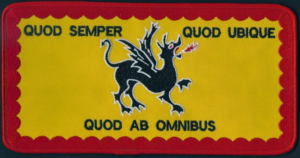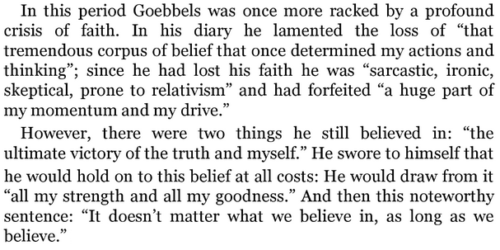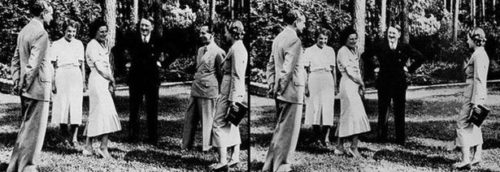A very long time ago I was in Chicago meeting with the man who wrote the security system for IBM’s AS400. I asked him “but why a Q” as we discussed the QSECOFR user account (Q Security Officer) used to manage the system.
He said it was a rare letter, denoting something special, and I had no reason to doubt him. This man claimed to have created the system for IBM and chose a Q for the simple reasons he said.
It’s true Q is rare. There’s only one Q tile in Scrabble and it has 10 points assigned (highest possible).

And it’s true such a letter would seem unique and distinctive and therefore sensible for special system communications.
Then many years later I was sitting on a train as the whistle blew several times when a pattern suddenly sounded familiar…
Two longs, a short and a long: – – . – (LLsL)
In international Morse code that signal pattern is the letter… wait for it… Q.
I did some searching and sure enough Union Pacific guideline (PDF) says Q is designated as crossing warning:
5.8.2 [7] Sound: – – o – Indication: When approaching public crossings at grade, with engine in front, sound signal…. Prolong or repeat signal until the engine completely occupies the crossing(s)…
Prolonging the signal until the engine is in the crossing probably explains why a letter would be preferred that ends in long instead of a short. Engineers can just hold the signal open until they’re well positioned.
However, I needed more. So from there I poked around the history of Q-codes in Morse, a list of special communications started around 1909 to facilitate transmissions.
Here’s part of a table of 1912 in a UK government handbook of wireless showing some of the basics (initially just 12 Q codes):

These days on video calls we say “your mute button is on” and “you’re breaking up” but a few decades ago radio operators could use codes like QLF (Q Left Foot) to indicate “try sending with your LEFT foot” and QNB (Q Number Buttons) for “How many buttons does your radio have?”
Amusing of course, yet still no deeper meaning for Q. It did little more than backup the story that IBM had used Q to emphasize uniqueness in system communications.
A book from 1952 called Thudbury however, gave this funny explanation:
I’ve heard that signal started on the Chicago, Burlington & Quincy line that everybody calls the ‘Q’ and just spread…
A similar sounding story from geography is found in a history of Britain’s Q fleet (“naval vessels that officially didn’t exist; the mystery ships of World War One”) designed to deceive, trap, and destroy German U-boats:
While in the dockyards, the mystery ships were known under various names, from decoy ships, which gave the game away somewhat, to “Q-ships”, or “S.S. (name)” ships. The “S.S.” in this case stood for “Special Service (Vessel)”. The “Q”, it’s suggested, was because they were operating from Queenstown, now Cobh, in Ireland.
Neither Queenstown for ships nor Quincy for trains are very convincing origin stories. A more likely possibility to me is that use of a Q flag on ships (yellow jack, Quebec) is an old signal meaning “I am ready for boarding” in harbor (a formal request for “free pratique“).
…ships signal either “My vessel is ‘healthy’ and I request free pratique” with a single Q (Quebec) flag or “I require health clearance” with the double signal QQ (Quebec Quebec). Either is correct for a vessel yet to be cleared for pratique (pratique is permission to do business at a port, granted to a ship that has met quarantine or other health regulations). The Q (Quebec) flag is square in shape and pure yellow. Continuing to fly either of these signals indicates a vessel is yet to receive clearance (and is thus effectively in quarantine).
Thus a Q ship in 1914 also could have been a play on words; an invitation to the enemy to come closer and be ambushed.
Further to this point Q also may stand for Quartermaster, the person on ancient ships designated to lead a boarding party to another ship across the aft (quarter deck).
It’s an interesting point to consider how Q for ships meant ready for boarding by local authorities (“effectively in quarantine”) when entering a harbor, yet Q for trains was taken to be the opposite and a warning for everyone to move away from them. Or are those two the same thing?
Some theories on the Internet include bits of Q stands for the Queen Victoria in England and royalty on ships or trains would use a Q to indicate their right of way.
According to W. M. Acworth in The Railways of England, whenever the Queen travelled by train, special precautions were taken. All work along the line was stopped, the points were locked, trains going in the opposite direction were halted and level crossings were closed and guarded.
Here’s another version in video format:
Back in the time when the queen traveled by ship in England, ships with the queen on board would do this sequence on the horn to announce to other ships in the harbour to get out of the way. When the queen switched to railways, the same signal followed and the Engineer
would do the sequence coming into a station to allow some space for Her Majesty.
The problem I have with these royal takes is nothing yet seems to actually support such use for the letter Q (why not use K for King?). And that is not to mention ships and trains seem to have landed on opposite ends with their uses for Q.
Speaking of Queens and right of way, the Q was repurposed recently allegedly by someone with a signals or intelligence background who called themselves “Q Clearance Patriot” in reference to DOE’s Q level of access authorization
The DOE classifications for access come from the end of WWII when a newly created Atomic Energy Commission (AEC) was faced with qualifying lots of civilian workers. A book called Advanced Criminal Investigations and Intelligence Operations explains:

This is not to be confused with the Army Special Forces Q Course (SFQC) for qualification.
And it now amounts to be a symbol of fascism extensively used by right-wing groups to signal intentions to replace democratic norms of law and order with “permanent improvisation“.
Although maybe one could argue the banner of “Quod Semper Quod Ubique Quod Ab Omnibus” (That will always be taken everywhere by all) is like saying the KKK carried a QQQ message.

And maybe that banner today would translate more roughly into the QAnon slogan of “Where we go one we go all”.

Speaking of Q banners and patches, below you can see an infamous image posted by the White House on their Twitter account showing Florida law enforcement and US Vice President are all smiles around a very prominent red “Q” patch being worn:

What does he mean by wearing that particular Q?
QAnon’s conspiracy theory is a rebranded version of the Protocols of the Elders of Zion… The world has seen QAnon before. It was called Nazism. In QAnon, Nazism wants a comeback.
That man in the image I suppose to be a physical manifestation of someone who wanted to elevate to QSECOFR by applying a fascist Q symbol to himself yet instead “he ‘discredited the agency, the country and himself’” and lost his system privileges.
Update January 11:
I’ve been asked several questions privately about this so I’ll post answers here publicly in case others have the same interest.
1) What about the Q hypothesis of Christianity?
I don’t know but that’s a very interesting twist based on an English Bishop (Herbert Marsh). Q Anon then could be a pun by Christian Party (Nazi) adherents to myths rather than just something to do with alleged authorization in US government. Even if Matthew and Luke were independent yet used a common document, the Q hypothesis is indeed about a secret source for faith.
2) How hard is it to find Q Clearance Patriot?
This begs the question of whether such a person exists, or is an intentional fabrication and myth (see answer above) managed by several people and their associates. It also begs whether the right people are motivated to find any person(s). It’s not that hard to find a person when they make mistakes, and everyone makes mistakes, so the right people just have to be watching to capture and respond to the error.



